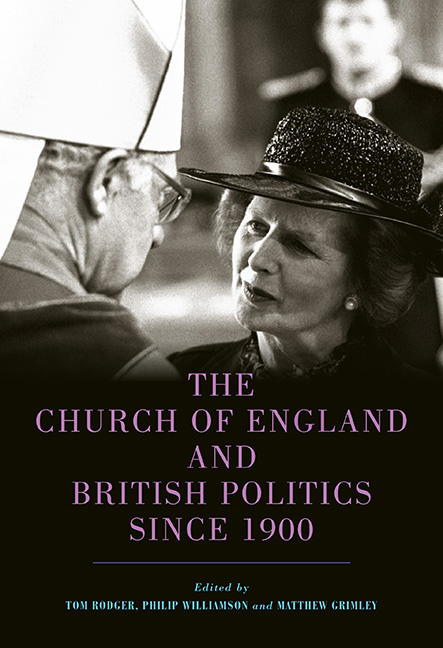Book contents
- Frontmatter
- Contents
- Notes on contributors
- Preface
- Abbreviations and locations of principal collections
- Introduction: the Church of England, the British state and British politics during the twentieth century
- 1 The politics of Church defence: Archbishop Davidson, the national church and the ‘national interest’, c. 1900–14
- 2 Archbishops and the monarchy: leadership in British religion, 1900–2012
- 3 Ecclesiastical conservatism: Hensley Henson and Lord Hugh Cecil on Church, state and nation, c. 1900–40
- 4 Hensley Henson, the prayer book controversy and the conservative case for disestablishment
- 5 Assembling an Anglican view of self-governing sexual citizenship, 1918–45
- 6 Politics in the parish: Joseph Needham at Thaxted, c. 1925–85
- 7 Anglicans, reconstruction and democracy: the Cripps circle, 1939–52
- 8 Parliament and the law of the Church of England, 1943–74
- 9 The Church of England and religious education during the twentieth century 199
- 10 Spiritual authority in a ‘secular age’: the Lords Spiritual, c. 1950–80
- 11 ‘A sort of official duty to reconcile’: Archbishop Fisher, the Church of England and the politics of British decolonization in East and Central Africa
- 12 A ‘baffling task’: Archbishop Fisher and the Suez Crisis
- 13 John Collins, Martin Luther King, Jr, and transnational networks of protest and resistance in the Church of England during the 1960s
- 14 The Church of England, minority religions and the making of communal pluralism
- Index
- STUDIES IN MODERN BRITISH RELIGIOUS HISTORY
1 - The politics of Church defence: Archbishop Davidson, the national church and the ‘national interest’, c. 1900–14
Published online by Cambridge University Press: 28 April 2020
- Frontmatter
- Contents
- Notes on contributors
- Preface
- Abbreviations and locations of principal collections
- Introduction: the Church of England, the British state and British politics during the twentieth century
- 1 The politics of Church defence: Archbishop Davidson, the national church and the ‘national interest’, c. 1900–14
- 2 Archbishops and the monarchy: leadership in British religion, 1900–2012
- 3 Ecclesiastical conservatism: Hensley Henson and Lord Hugh Cecil on Church, state and nation, c. 1900–40
- 4 Hensley Henson, the prayer book controversy and the conservative case for disestablishment
- 5 Assembling an Anglican view of self-governing sexual citizenship, 1918–45
- 6 Politics in the parish: Joseph Needham at Thaxted, c. 1925–85
- 7 Anglicans, reconstruction and democracy: the Cripps circle, 1939–52
- 8 Parliament and the law of the Church of England, 1943–74
- 9 The Church of England and religious education during the twentieth century 199
- 10 Spiritual authority in a ‘secular age’: the Lords Spiritual, c. 1950–80
- 11 ‘A sort of official duty to reconcile’: Archbishop Fisher, the Church of England and the politics of British decolonization in East and Central Africa
- 12 A ‘baffling task’: Archbishop Fisher and the Suez Crisis
- 13 John Collins, Martin Luther King, Jr, and transnational networks of protest and resistance in the Church of England during the 1960s
- 14 The Church of England, minority religions and the making of communal pluralism
- Index
- STUDIES IN MODERN BRITISH RELIGIOUS HISTORY
Summary
Successive expansions of the parliamentary electorate in 1867 and 1884 and the associated growth of mass party-political organizations destabilized the balance of established interests which had shaped Georgian and early-Victorian politics. The legitimacy of hereditary and patrician claims to political authority, most markedly expressed by the Conservative and Unionist alliance, was challenged by new representative and quasi-democratic forces, channelled chiefly into the Liberal Party. During the two decades before the First World War the party-political dynamic came to centre more sharply around the political and cultural identities of the United Kingdom: the appropriate relations between its constituent ‘nations’, the locus of constitutional authority, the apportionment of political power among social and religious groups, and the role of the state and its proxies in the provision of public services.
The Liberal government of 1905 drew on its substantial majority at the 1906 general election to claim a mandate for wide-reaching educational, social and financial reforms; in parliamentary coalition with Irish Nationalist and Labour allies after the 1910 elections it undertook to pass substantial constitutional changes. Most of these policies were met with uncompromising opposition from the Unionists, who used their dominance of the House of Lords to frustrate and, when they judged it desirable, to veto government legislation. Such actions fed the Liberal political narratives – of legitimate ‘democratic’ authority ranged against the illegitimate authority of patrician and hereditary forces who used their control of political institutions to serve their own interests rather than those of ‘the nation’.
The established Church of England could not avoid entanglement in this political dynamic. The Church was woven – and had woven itself – into the fabric of existing political, social and cultural authority, not just within its formal jurisdiction in England and Wales, but also in the national institutions of the United Kingdom. The archbishops and leading bishops straddled the high ecclesiastical and political offices, as members of the Privy Council and as ‘Lords Spiritual’ in the House of Lords. Church institutions and associations were integrated into the state's provision of social services. The existing patterns of power in state and society could not be challenged without also extending that challenge to the role of the Church of England in the political life of the United Kingdom.
- Type
- Chapter
- Information
- The Church of England and British Politics since 1900 , pp. 36 - 56Publisher: Boydell & BrewerPrint publication year: 2020

